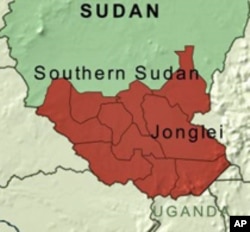For government supporters, the ban on Al-Intibaha is simple: the paper violated the 2005 Comprehensive Peace Agreement signed between the ruling National Congress Party(NCP) and the Sudan People’s Liberation Movement (SPLM).
The CPA calls on both leading parties to work closely to make unity "attractive” ahead of next year’s scheduled referendum on independence for the south.
Rabie Abdulatti Obeid, an official of the National Congress Party, says Al-Intibaha and other censored papers encourage separatism and even secession, which he says is contrary to the peace accord.
“One of the major reasons for the stoppage of [Al-Intibaha and other newspapers] is that they promote secession between north and south. They think that unity between south and north is contradictory.”
Legality questioned
The chairman of the board and director of Al-Intibaha says the closing of the publication is illegal. Altayeb Mustafa says the CPA gives newspapers, like southern voters, the choice of supporting succession.
"We are moving within the mandate of the CPA," he says. "It gives the option for the people of the south to decide between unity and separation. Everyone has the right to decide. We are the only paper in the north advocating separation; there are papers in the south calling for separation from the north; [Under the CPA, supporting unity is] optional, not compulsory."
Al-Tayeb says he believes security forces closed Al-Intibaha to placate politicians in the south, where the paper is also circulated.
He says the publication exposes famine, corruption and press freedom in the region, which he says is becoming a “failed state.” He says two years ago, Sudan’s vice president Salva Kiir, who is also the head of the Government of Southern Sudan, wrote to the Minister of Justice, asking him to close Al-Intibaha.
Hate speech
Critics say the paper uses derogatory terms against southerners, which some say violates constitutional guarantees against hate speech. Al-Tayeb denies the charge, but says in his opinion the CPA is based on racial, or ethnic, politics because it allows the south’s ethnic groups, or “races,” in his words, to decide if they should separate from the rest of the country. Al-Tayeb says his paper is suggesting the same right for northerners to vote for secede from the republic.
“I defy anyone who says I said in any of our articles that we defame [the south]. We are not racists – we all have African blood. The problem is between the north and the south. We never say southern Sudanese are [inferior]. It is against our religion, against Islam,” he says.




